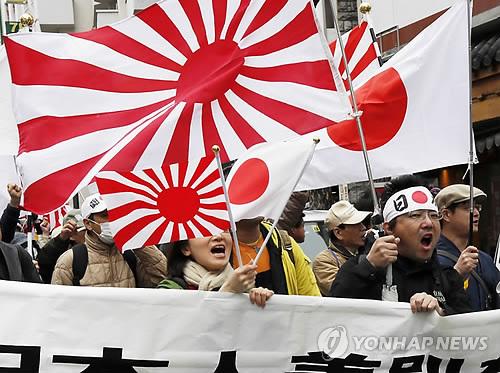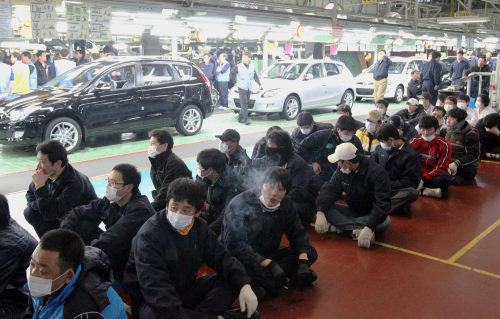Korea
Japan: Government statement marking 70 years since WWII end is deceitful

"The Abe administration is composed of and supported by extreme rightists who are trying
Barry Sheppard: Three theories of the USSR

"In the US and elsewhere, i
Behind the crisis: US tightens chokehold on North Korea

US and South Korean soldiers take part in joint military exercises in Pohang, South Korea.
By David Whitehouse
April 22, 2013 -- Socialist Worker (USA) -- In the 60 years since the end of the Korean War, US policy toward North Korea has fluctuated between the options of "containment" and "rollback".
Sometimes, the policy has shifted in the course of one presidency. Bill Clinton and George W. Bush both started out as advocates of rollback -- regime change, either by military force or by provoking an internal collapse -- but ended as caretakers of containment.
Barack Obama -- who campaigned for the White House in 2008 on a promise to conduct direct talks with North Korea, in contrast to the belligerent rhetoric of the Bush years -- seems to have followed an opposite trajectory since his first months in office. Though you wouldn't know it to judge from the US media, this aggressive posture in Washington is a driving factor in the escalating tensions that have landed the Korean conflict on the front pages in recent weeks.

US sailors aboard the aircraft carrier George Washington pre
Fidel Castro: The duty to avoid a war in Korea

"Now that [the Democratic People’s Republic of Korea] has
South Korea: Struggles by 'irregular' workers multiply, solidarity needed
January 11, 2011, irregular cleaning staff at Hongik University in Seoul protest their unfair dismissal.
[For more background to the South Korean irregular workers’ struggle, see Chris Kim’s excellent article on the Hyundai irregular workers’ strike in Ulsan: “South Korea: ‘Just the first round’ by ‘irregular workers’ at Hyundai Motors”, Links International Journal of Socialist Renewal, December 16, 2010.]
By Roddy Quines
US imperialist aggression in the early 21st century
Washington has reactivated the US Navy’s 4th Fleet to ensure US power projection over the Caribbean, Central and South America.
[This talk was presented at the regional “socialism conference” was held in Manila from November 27 to 28, 2010. The conference was organised by the socialist Partido Lakas ng Masa (Party of the Labouring Masses) and the socialist-feminist regional network Transform Asia.]
By Rasti Delizo
Martin Hart-Landsberg: What’s happening on the Korean Peninsula?
By Martin Hart-Landsberg
December 31, 2010 -- Reports from the Economic Front -- What’s happening on the Korean peninsula? If you read the press or listen to the talking heads, your best guess would be that an insane North Korean regime is willing to risk war to manage its own internal political tensions. This conclusion would be hard to avoid because the media rarely provide any historical context or alternative explanations for North Korean actions.
For example, much has been said about the March 2010 (alleged) North Korean torpedo attack on the Cheonan (a South Korean naval vessel) near Baengnyeong Island, and the November 2010 North Korean artillery attack on Yeonpyeong Island (which houses a South Korean military base).
The conventional wisdom is that both attacks were motivated by North Korean elite efforts to smooth the leadership transition underway in their country. The take away: North Korea is an out-of-control country, definitely not to be trusted or engaged in negotiations.
But is that an adequate explanation for these events? Before examining the facts surrounding them, let’s introduce a bit of history. Take a look at the map below, which includes both Baengnyeong and Yeonpyeong Islands.
Tariq Ali on Mao Zedong and communism in China
"Mao images are for sale, popular in China and not just with tourists, hi
South Korea: `Just the first round' by `irregular workers' at Hyundai Motors

Hyundai Motors workers' sit-in at Hyundai's plant in Ulsan.
reports on strikes and factory occupations at Hyundai Motor Company in South Korea, which is building solidarity among regular and irregular workers, and among workers internationally.
December 16, 2010 -- Socialist Worker (US) -- "Even a worm will squirm when it is being stepped on" is an old Korean idiom that basically means that even the most powerless creature reacts against an aggressor. However, when such a worm is transformed into a fearful dragon, it will do a lot more than just squirm, to the point that you had better think twice about stepping on it.
That's what happened at one of South Korea's most profitable companies, Hyundai Motors, when the company's irregular workers mobilised with strikes and factory occupations during the middle of November, after decades of being "stepped on". Before we start with that fateful day of November 15, we need to take a look at how it progressed.
